NGO cooperation reaches 238 million people in 119 countries worldwide

The Italian Civil Society Organisations active in development cooperation and humanitarian aid today present their transparency data for the year 2022 through the Open Cooperation portal, a platform that has been collecting transparency and accountability data from over 200 of the most important organisations in the sector for the past eight years.
The data, entered voluntarily by NGOs, Foundations and other Third Sector organisations, were aggregated by Open Cooperazione and made public in the opendata portal through graphs and info-graphics. Also in 2022 Italian NGOs registered an economic growth of almost 10 percentage points, the economic value is close to 1.3 billion euro. Save the Children, Intersos, Fondazione AVSI, Comitato Italiano per l’UNICEF, COOPI, Doctors Without Borders, Emergency, WeWorld, ActionAid and Doctors with Africa are confirmed as the top ten Italian organisations on the basis of their revenue budgets.
The composition of income remains stable compared to previous years, for NGOs the ratio of public funds to private funds stands at 60% and 40% respectively. Public funds to NGOs come from the so-called institutional funders, 35% from the Italian Agency for Cooperation AICS and MAECI, another 35% from the European Union (EU+Echo), slightly more than 18% from territorial authorities through decentralised cooperation, and the remaining 12% from UN agencies and other international organisations.
On the other hand, the scenario of private funds is evolving. In addition to those deriving from individual liberal donations, income from donations or partnerships with companies (41%, up 10% on 2021) and from Foundations (35%, up almost 10 percentage points) is growing significantly. The 5×1000 tax channel contributes 17% and churches around 6%.
The 2022 data show how the geography of cooperation is always evolving. The increase in the number of projects and CSOs active in emergency contexts confirms the capacity of Italian civil society organisations to intervene in the various crises that are increasingly opening up globally, observes Elias Gerovasi, curator of the Open Cooperation project. Organisations also maintain a strong presence in so-called forgotten conflicts, such as Yemen, Sudan and Syria, and in many areas destabilised by armed gangs such as Burkina Faso, Mozambique, Niger and Mali. In these contexts, without the cooperation of NGOs it would be impossible to provide basic assistance to the affected populations.
Continue reading the article published on the Open Cooperation website HERE
